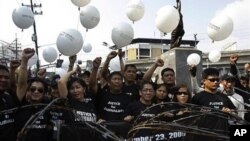One year ago more than 50 people were killed in what is considered the Philippines' worst act of political violence. Groups around the country are remembering those who died, and are calling for a faster effort to bring the killers to justice.
A year ago Tuesday, a convoy of supporters and media workers was on its way to register election papers for a gubernatorial candidate in the southern province of Maguindanao. They were intercepted by gunmen allegedly led by Andal Ampatuan Junior, who abducted and then killed all of them, including the wife and sister of the candidate.
In honor of the victims, several Catholic parishes throughout the country marked the slayings of the 57 people by ringing church bells. Radio and television broadcasters ran moments of silence throughout the day. And journalist groups held prayers.
President Benigno Aquino - wearing a black armband - declared November 23rd a national day of remembrance and ordered government workers to wear black. He also said more arrests should be made in the case, which has close to 200 suspects. So far less than 100 have been brought in.
The trial of their alleged leader, Andal Ampatuan Junior, started just two months ago. He has pleaded not guilty and his politically powerful family denies the allegations.
Human Rights Watch Asia Director Elaine Pearson says the trial is a step in the right direction but the government is not doing enough.
"The administration has been so off the mark in taking on the broader issue of private armies," she said.
Political rivalries can escalate to murder in the Philippines, where some provincial leaders and wealthy families maintain private militias.
Human Rights Watch and another advocacy group, Amnesty International, contend as long as the private armies exist, ordinary citizens will be at risk.
"We do understand there's an insurgency going on in Mindanao," said Pearson. "But we believe this insurgency would be best fought by professional police and military rather than arming paramilitias which are not well-trained and in the end are doing the bidding of local ruling families in these areas far from Manila."
The Philippines suffers from a Muslim separatist movement in the south, as well as a communist insurgency. And for years, journalists investigating corruption, labor activists and human rights workers have been threatened and killed; in most cases, no one is ever arrested for the crimes.
Philippines Marks Anniversary of Political Massacre
- By Simone Orendain




